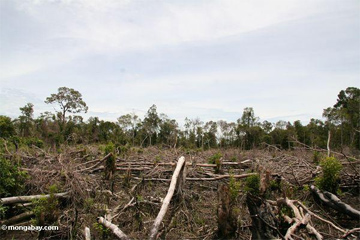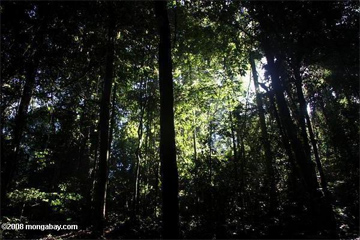2009 may prove to be an important turning point for tropical forests.
Lead by Brazil, which had the lowest extent of deforestation since at least the 1980s, global forest loss likely declined to its lowest level in more than a decade. Critical to the fall in deforestation was the global financial crisis, which dried up credit for forest-destroying activities and contributed to a crash in commodity prices, an underlying driver of deforestation.
2009 was also notable for progress made on REDD, a proposed climate change mitigation mechanism that would pay tropical countries for protecting their forests. Over the course of the year, world business and political leaders, prominent scientists and conservation groups, celebrities, and other noted figures voiced support for the concept. Momentum carried into climate talks in Copenhagen, where REDD was one of the only areas to see gains. Concerns over REDD now revolve mostly around the details (implementation, financing, governance, and equity) of the mechanism, rather than underlying idea of compensating rainforest conservation as a means to reduce greenhouse gas emissions.
Drivers of Deforestation
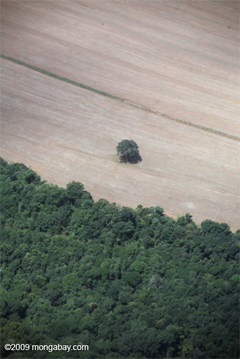 Forest clearing in Mato Grosso. Photo by Rhett A. Butler. |
2009 saw major developments reflecting the implications of the shift from poverty-driven deforestation to enterprise-driven deforestation, a trend that continues to accelerate with urbanization and abandonment of government-sponsored colonization projects. While corporations and large landowners have ever-increasing capacity to deforest, the recent shift seems to offer new opportunities for rainforest conservation in that it is easier for pressure groups to target corporations and enterprises rather than tens of millions of poor farmers who are simply trying to put food on the table for their families. Accordingly, major industrial drivers of deforestation — the palm oil, cattle ranching, and logging industries — were significantly affected by activist campaigns in 2009.
In Brazil, the cattle industry was walloped by a Greenpeace report that linked some of the world’s most prominent brands — Nike, Toyota, Prada, and others — to destruction of the Amazon rainforest. The fallout from the report was immediate. Some of the world’s largest beef and leather buyers suspended contracts with suppliers associated with Amazon forest clearing. The Brazilian government announced a crackdown and fines, raided the offices of powerful cattle companies, and called for a review of loan programs. Government ministers joined the private sector in demanding new chain-of-custody controls for suppliers to ensure that cattle products were not contributing to deforestation. The largest cattle producers and traders soon responded with a moratorium on Amazon deforestation and a promise to implement improved supply-chain tracking mechanisms. The Brazilian cattle industry may now be on the cusp of transitioning from being the world’s largest single driver of deforestation to a critical component in helping slow climate change.
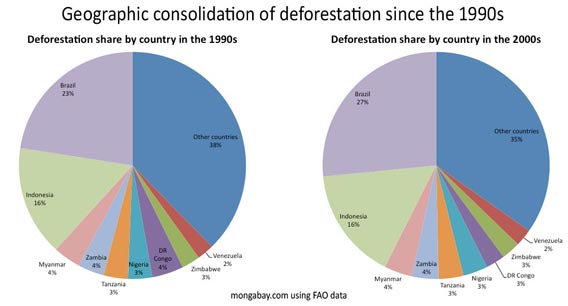 Since the 1990s deforestation has become increasingly concentrated. Recently published research by Matt Hansen of South Dakota State University suggests an even more dramatic shift in recent years. His work, which is based off of high resolution satellite imagery, shows that Brazil and Indonesia accounted for 61 percent of tropical deforestation between 2000 and 2005, rather than the 43 percent reported by the U.N. Food and Agriculture Organization (FAO). |
In Southeast Asia, the palm oil industry was stung by the decision by Unilever, the world’s largest buyer of palm oil, to suspend its contract with Sinar Mas, the world’s second largest producer of palm oil, after an investigation commissioned by the consumer products giant found allegations made by Greenpeace about the palm oil producer’s environmental record to be true. The investigation’s findings were a set back to the Roundtable on Sustainable Palm Oil (RSPO), of which Sinar Mas was a member (although its operations had not yet been certified as as environmentally responsible). Several other prominent palm oil buyers, including Cadbury-New Zealand and Lush Cosmetics, announced they would stop using palm oil in their products following consumer concerns about deforestation. Meanwhile an internal audit by the World Bank’s International Finance Corporation (IFC) concluded it had violated its own environmental rules in lending to palm oil companies. Two palm oil companies announced they would forgo development of concessions in carbon-rich areas, instead opting to preserve forests on the land for carbon payments.
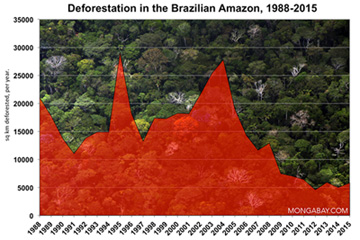
|
In the forestry sector, several large firms severed ties with timber and pulp and paper companies linked by reports from NGOs to questionable logging practices in Indonesia. The United States and Europe stepped up enforcement of laws and regulations (the Lacey Act in the U.S. and FLEGT in Europe) meant to hold importers to environmental laws in timber-producing countries, while a Brazilian federal prosecutor launched an investigation into charges that illegal timber from the state of Pará is being laundered as “eco-certified” wood and exported to markets in the United States, Europe, and Asia. China’s Ministry of Environmental Protection draft regulations that would require Chinese companies operating abroad to comply with environmental laws of China and the host country, although it is unclear whether these will actually be enforced.
More Good News
2009 was marked by a number of other hopeful developments for tropical forests. Brazil, Peru, and the Democratic Republic of Congo established massive new rainforest parks, while Papua New Guinea created it first nature reserve. Norway continued to lead industrialized countries in funding rainforest conservation, contributing a quarter of a billion dollars to Guyana and reiterating its billion dollar pledge to Brazil. The United States, Japan, Australia, France, and the United Kingdom also made large financial commitments towards tropical forests.
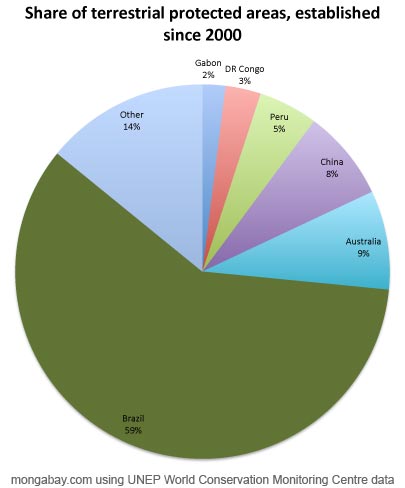
|
Indigenous rights in Brazil got a boost after a court victory in a dispute with farmers in Roraima and a legal opinion finding that the Surui tribe owns the carbon rights to the land they inhabit, perhaps leading the way for future indigenous-run forest carbon projects. The Surui also unveiled its partnership with Google in developing tools that will enable the tribe to better monitor their territory for encroachment by loggers, miners, and ranchers. Working with leading scientific institutions and NGOs, Google announced the Earth Engine platform, a system that combines its computing power with advanced monitoring and analysis technologies. The platform promises to enable near real-time monitoring of the world’s forests and carbon at high resolution at selected sites before 2011. Meanwhile the Woods Hole Research Institute reported progress on a high resolution global forest map for tracking land cover change.
And Some Bad News
|
Deforested area and healthy forest in Borneo. |
But the good news for tropical forests was tempered by developments including Indonesia announcing its intentions to open up more than 2 million hectares of carbon-dense peatlands to old palm development; the collapse in law enforcement in Madagascar, contributing to an explosion of commercial timber (and lemur) harvesting in that country’s spectacular rainforest parks; a breakdown at the RSPO meeting over efforts to reduce greenhouse gas emissions from palm oil production; violent conflict in Peru between government security forces and indigenous groups over land rights and resource extraction; massive foreign land acquisitions in the Congo Basin; dodgy REDD dealings in Indonesia and Papua New Guinea; and large-scale expansion of oil palm agriculture in the Amazon. Brazil moved to grant amnesty to farmers and ranchers who illegally occupy or have illicitly cleared Amazon forest lands, a decision that some say legitimizes past deforestation (others maintain it is a critical step towards improved governance in the region).
Looking forward
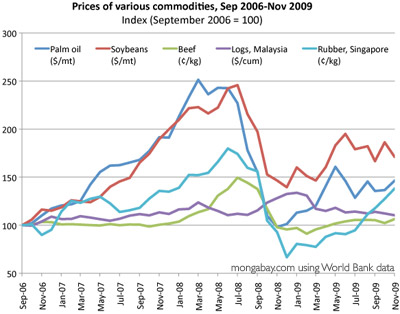
|
While 2009’s developments are likely to have long-term implications for conservation, the fate of tropical forests is far from determined. Looking forward, things to watch include: the impact of economic recovery on commodity prices and agricultural expansion for food and biofuels production; large-scale land acquisition by foreign nations and corporations in tropical countries; climate negotiations and the REDD mechanism, including controversies over land rights, “offsetting”, forest definitions, and sustainable forest management; the emergence of payments for ecosystem services beyond REDD; the cap-and-trade versus carbon tax schemes; efforts to address the demand side of deforestation — notably consumption; emerging certification systems for agricultural and forestry products (i.e. RSPO, Aliança da Terra, FSC, etc); and Brazil’s progress in meeting its deforestation reduction targets.
Below are some forest news highlights from 2009.
TROPICAL FOREST HIGHLIGHTS
Ecuador to be paid to leave oil in the ground
(12/23/2009) Ecuador will establish a trust fund for receiving payments to leave oil reserves unexploited in Yasuni National Park, one of the world’s most biodiverse rainforest reserves, reports the UN Development Programme, the agency that will administer the fund.
Brazil establishes 20,000 sq mi of new indigenous reserves in the Amazon
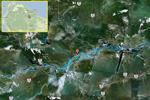
(12/23/2009) On Monday, Brazil decreed nine new indigenous reserves covering 51,000 square kilometers (19,700 square miles) of the Amazon rainforest, an areas larger than Denmark or Switzerland, reports the AFP. Five of the reserves are located in the state of Amazonas, two are in Pará, one is in Roraima, and another is in Mato Grosso do Sul. The protected areas house about seven thousand Indians from 29 ethnic groups, according to FUNAI (Fundação Nacional do Índio), Brazil’s indigenous affairs agency.
Dead REDD? Not quite, but plan to protect forests suffers set back in Copenhagen
(12/20/2009) A plan to reduce tropical deforestation by paying developing countries to protect forests was postponed Saturday after world leaders failed to produce a binding climate agreement, reports the Associated Press.
U.S. pledges $1B towards rainforest conservation
(12/17/2009) The U.S. will contribute $1 billion towards an effort to reduce emissions from deforestation, according to Agriculture Secretary Tom Vilsack.
Google’s Earth Engine to help tropical countries monitor forests
(12/16/2009) A powerful forest monitoring application unveiled last week by Google will be made freely available to developing countries as a means to build the capacity to quality for compensation under REDD, a proposed climate change mitigation mechanism that would pay tropical countries for protecting forests, according to a senior Google engineer presenting at a side event at COP15 in Copenhagen.

(12/16/2009) In the midst of cyclone season, a ‘dead’ period for tourism to Madagascar’s east coast, Vohémar, a sleepy town dominated by the vanilla trade, is abuzz. Vanilla prices have scarcely been lower, but the hotels are full and the port is busy. “This afternoon, it was like a 4 wheel drive show in front of the Direction Regionale des Eaux & Forets,” one source wrote in an email on November 29th: “Many new 4×4, latest model, new plane at the airport, Chinese everywhere.”
Forest destruction by Sinar Mas undermines efforts to develop and promote greener palm oil
(12/14/2009) An investigation commission by Unilever, the world’s largest buyer of palm oil, confirms that Indonesian group Sinar Mas, the world’s second largest producer of palm oil, has been destroying forests and peatlands despite committing to “greener” palm oil production as a member of the Roundtable on Sustainable Palm Oil (RSPO). Unilever has now suspended its $32.6 million contract with Sinar Mas.
Brazil grants deforestation amnesty for farmers and ranchers
(12/14/2009) A decree issued by President Luiz Inacio Lula da Silva suspends up to $5.7 billion in fines and gives ranchers and farmers in the Amazon two more years to come into compliance with environmental laws aimed to curtain deforestation, reports the Associated Press.
Brazil allocates first funds under plan to save the Amazon
(12/10/2009) Brazil’s development bank BNDES has announced the first five recipients of grants under the South American country’s ambitious Amazon Fund, which aims to reduce deforestation by 70 percent over the next decade.
Global forest map moves forward
(12/11/2009) A plan to create a pan-tropical map of forest cover and carbon stocks is moving ahead with data now available on Google Earth, reports the Woods Hole Research Center.
Google Earth to monitor deforestation

(12/10/2009) It what could be a critical development in helping tropical countries monitor deforestation, Google has unveiled a partnership with scientists using advanced remote sensing technology to rapidly analyze and map forest cover in extremely high resolution. The effort could help countries detect deforestation shortly after it occurs making it easier to prevent further forest clearing.
Brazilian tribe owns carbon rights to Amazon rainforest land

(12/09/2009) A rainforest tribe fighting to save their territory from loggers owns the carbon-trading rights to their land, according to a legal opinion released today by Baker & McKenzie, one of the world’s largest law firms. The opinion, which was commissioned by Forest Trends, a Washington, D.C.-based forest conservation group, could boost the efforts of indigenous groups seeking compensation for preserving forest on their lands, effectively paving the way for large-scale indigenous-led conservation of the Amazon rainforest. Indigenous people control more than a quarter of the Brazilian Amazon.
Brazil releases official Amazon deforestation figures for 2009
(11/13/2009) Deforestation in the Brazilian Amazon fell nearly 46 percent to the lowest annual loss on record in 2009, reported the Brazilian government Thursday.
Norway to give Guyana up to $250M for rainforest conservation
(11/09/2009) Norway will provide up to $250 million to Guyana as part of the South American country’s effort to avoid emissions from deforestation.
Impasse over palm oil emissions at RSPO meeting
(11/04/2009) Environmentalists and palm oil producers meeting at the annual Roundtable on Sustainable Palm Oil (RSPO) were locked in an impasse over how to account for emissions from converting forests and peatlands to oil palm plantations, report conference attendees.
Brazilian beef giants agree to moratorium on Amazon deforestation
(10/07/2009) Four of the world’s largest cattle producers and traders have agreed to a moratorium on buying cattle from newly deforested areas in the Amazon rainforest, reports Greenpeace.
Independent review finds logging company has abused rights of indigenous Penan in Borneo

(09/15/2009) An independent review of Interhill Logging found that the Sarawak logging company has regularly violated forest laws and abused the rights of the indigenous Penan peoples. The review, conducted by French tourism giant ACCOR, found that Interhill Logging had not received free, prior, and informed consent from the local Penan people for its logging operations; the logging being done by Interhill “is very definitely not sustainable”; the company is not fully compiling with Sarawak’s Natural Resources and Environment Board; and Interhill is providing no long-term benefits to the Penan peoples.
Britain bans palm oil ad campaign
(09/09/2009) Britain’s Advertising Standards Authority (ASA), a group that regulates advertisements, has again banned “misleading” ads by the palm oil industry, reports the Guardian. ASA ruled that a campaign run by the Malaysian Palm Oil Council (MPOC) makes dubious claims, including that palm oil is the “only product able to sustainably and efficiently meet a larger portion of the world’s increasing demand for oil crop-based consumer goods, foodstuffs and biofuels.” The ad said criticism over “rampant deforestation and unsound environmental practices” were part of “protectionist agendas” not based on scientific fact. ASA held the ad breached several of its advertising standards codes, including “substantiation,” “truthfulness,” and “environmental claims.” In rebuking the MPOC, the ASA said that the merits of new eco-certification scheme promoted by the palm oil industry is “still the subject of debate” and that the ad’s attacks on detractors implied that all criticisms of the palm oil industry “were without a valid or scientific basis.”
Concerns over deforestation may drive new approach to cattle ranching in the Amazon

(09/08/2009) While you’re browsing the mall for running shoes, the Amazon rainforest is probably the farthest thing from your mind. Perhaps it shouldn’t be. The globalization of commodity supply chains has created links between consumer products and distant ecosystems like the Amazon. Shoes sold in downtown Manhattan may have been assembled in Vietnam using leather supplied from a Brazilian processor that subcontracted to a rancher in the Amazon. But while demand for these products is currently driving environmental degradation, this connection may also hold the key to slowing the destruction of Earth’s largest rainforest.
Destruction worsens in Madagascar
(08/20/2009) Armed bands are decimating rainforest reserves in northeastern Madagascar, killing lemurs and intimidating conservation workers, despite widespread condemnation by international environmental groups.
World Bank violated environmental rules in lending to palm oil companies, finds internal audit
(08/18/2009) A coalition of indigenous rights’ organizations and green groups is calling on the World Bank’s International Finance Corporation (IFC) to suspend lending to oil palm plantation developers over revelations by its own internal auditors that the loan-making entity failed to follow its own procedures for protecting against social and environmental abuses.
Cadbury dumps palm oil after consumer protests

(08/17/2009) Cadbury New Zealand, responding to widespread consumer protests, will stop adding palm oil to its milk chocolate products, reports the New Zealand Herald. The candy-maker substituted palm oil and other vegetable fat for cocoa butter earlier this year. The company cited cost savings for the decision, but the move triggered outcry from environmental groups who blame palm oil production for destruction of rainforests across Indonesia and Malaysia, key habitat for orangutans and other endangered species. Concerns that Cadbury chocolate could be imperiling orangutans led the Auckland Zoo and others to ban Cadbury products. Meanwhile consumers swamped the company with letters and petitions protesting its use of palm oil.
LUSH cosmetics launches campaign against palm oil
(08/10/2009) LUSH Cosmetics, a leading cosmetics-maker, will no longer use palm oil due to environmental concerns over its production. LUSH, which is now selling a palm oil-free soap, has launched a two-pronged campaign to make consumers aware of the impacts of palm cultivation on tropical forests and encourage other consumer-products companies, including Procter & Gamble, Unilever and Nestle, to reformulate their products using alternatives to palm oil.
Peru to proceed with oil and gas auctions in the Amazon despite indigenous protests
(08/07/2009) Despite violent protests by indigenous groups over plans to expand oil and gas exploration in the Peru’s Amazon rainforest, energy investments in the South American country are expected to increase to $1.5 billion in both 2009 and 2010, reports Reuters.

(08/03/2009) Barely six weeks after a dozen Amazon natives were gunned down by the Peruvian Army in the oil town of Bagua for protesting the cozy relationship between Big Oil and the government of President Alan Garcia, I find myself on the banks of the Mother of God River in Salvacion, Peru, wondering if all those folks died in vain. Any day now, the bulldozers will be moving in as Texas-based Hunt Oil Company – with the full go-ahead of the Peruvian government — fires its first salvo in its assault against the million-acre pristine rainforest wilderness of the little-known and largely unexplored Amarakaeri Communal Reserve.
Nike implements policy to avoid leather produced via Amazon deforestation
(07/22/2009) Nike is working with Greenpeace to ensure its products don’t contribute to destruction of the Amazon rainforest, according to statements from the shoe giant and the environmental activist group. The partnership comes after Greenpeace report accused Nike of using leather derived from cattle raised on illegal deforested Amazon land. The report, “Slaughtering the Amazon”, also linked other shoemakers to rainforest destruction, including Adidas, Reebok and Timberland.
Chevron expects to lose $27B suit but will refuse to pay damages
(07/22/2009) Chevron Corp. expects to lose a multibillion dollar environmental lawsuit in Ecuador but has no intention of paying damages and will continue to fight for “decades”, reports the Wall Street Journal.
Are we on the brink of saving rainforests?

(07/22/2009) Until now saving rainforests seemed like an impossible mission. But the world is now warming to the idea that a proposed solution to help address climate change could offer a new way to unlock the value of forest without cutting it down.Deep in the Brazilian Amazon, members of the Surui tribe are developing a scheme that will reward them for protecting their rainforest home from encroachment by ranchers and illegal loggers. The project, initiated by the Surui themselves, will bring jobs as park guards and deliver health clinics, computers, and schools that will help youths retain traditional knowledge and cultural ties to the forest. Surprisingly, the states of California, Wisconsin and Illinois may finance the endeavor as part of their climate change mitigation programs.
Palm oil companies trade plantation concessions for carbon credits from forest conservation
(07/22/2009) Indonesian palm oil producers are eying forest conservation projects as a way to supplement earnings via the nascent carbon market, reports Reuters.
Illegal Amazon timber passed off as eco-certified in massive wood laundering scheme
(07/12/2009) A Brazilian federal prosecutor is leading an investigation into charges that illegal timber from the state of Pará is being laundered as “eco-certified” wood and exported to markets in the United States, Europe, and Asia, reports Sunday’s edition of O Globo.
Auckland Zoo bans Cadbury chocolate due to palm oil content

(07/12/2009) Auckland Zoo has pulled Cadbury chocolates from its shops and restaurants following the candy maker’s decision to start adding palm oil to its chocolates, reports the Sunday Star Times. The zoo is also removing other products that contain palm oil, due to concerns that its production is driving rainforest destruction across Southeast Asia, putting orangutans and other species at risk. Cadbury said it made the change to palm oil for economic reasons. Palm oil, described as “vegetable fat” on its packaging, is cheaper than cocoa butter.
A New Idea to Save Tropical Forests Takes Flight
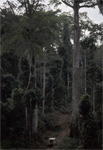
(06/29/2009) Every year, tens of millions of acres of tropical forests are destroyed. This is the most destabilizing human land-use phenomenon on Earth. Tropical forests store more aboveground carbon than any other biome. They harbor more species than all other ecosystems combined. Tropical forests modulate global water, air, and nutrient cycles. They influence planetary energy flows and global weather patterns. Tropical forests provide livelihoods for many of the world’s poorest and marginalized people. Drugs for cancer, malaria, glaucoma, and leukemia are derived from rainforest compounds. Despite all these immense values, tropical forests are vanishing faster than any other natural system. No other threat to human welfare has been so clearly documented and simultaneously left unchecked. Since the 1992 Rio Earth Summit (when more than 100 heads of State gathered to pledge a green future) 500 million acres of tropical forests have been cut or burned. For decades, tropical deforestation has been the No. 1 cause of species extinctions and the No. 2 cause of human greenhouse gas emissions, after the burning of fossil fuels. For decades, a few conservation heroes tried their best to plug holes in the dikes, but by and large the most diverse forests on Earth were in serious decline.
Brazilian miner Vale signs $500M palm oil deal in the Amazon

(06/25/2009) Vale, the world’s largest miner of iron ore, has signed a $500 million joint venture with Biopalma da Amazonia to produce 160,000 metric tons of palm oil-based biodiesel per year, reports Reuters. Vale says the deal will save $150 million in fuel costs starting in 2014, with palm oil biodiesel replacing up to 20 percent of diesel consumption in the company’s northern operations. The biodiesel will be produced from oil palm plantations in the Amazon state of Pará. The move is likely to stir up criticism from environmentalists that fear palm oil production could soon become a major driver of deforestation in the region.
Peru revokes decrees that sparked Amazon Indian uprising

(06/19/2009) Peru’s Congress revoked two controversial land laws that sparked violent conflicts between indigenous protesters and police in the country’s Amazon region. The move temporarily defuses a two-week crisis, with protesters agreeing to stand down by removing blockades from roads and rivers. Congress voted 82-14 Thursday to overturn legislative decrees 1090 and 1064, which would have facilitated foreign development of Amazon land. Indigenous groups said the decrees threatened millions of hectares of Amazon rainforest and undermined their traditional land use rights.
World Bank revokes loan to Brazilian cattle giant accused of Amazon deforestation

(06/13/2009) The Work Bank’s private lending arm has withdrawn a $90 million loan to Brazilian cattle giant Bertin, following Greenpeace’s release of a report linking Bertin to illegal deforestation of the Amazon rainforest, report environmental groups, Friends of the Earth-Brazil and Greenpeace. The loan, granted by the International Finance Corporation (IFC) in March 2007, was to expand Bertin’s meat-processing in the Brazilian Amazon. At the time, the IFC promoted the loan as a way to promote environmentally responsible beef production in the Amazon, although environmental groups — including Friends of the Earth-Brazil and Greenpeace — criticized the move.
Wal-Mart bans beef illegally produced in the Amazon rainforest

(06/12/2009) Brazil’s three largest supermarket chains, Wal-Mart, Carrefour and Pão de Açúcar, will suspend contracts with suppliers found to be involved in Amazon deforestation, reports O Globo. The decision, announced at a meeting of the Brazilian Association of Supermarkets (Abras) this week, comes less than two weeks after Greenpeace’s exposé of the Amazon cattle industry. The report, titled Slaughtering the Amazon, linked some of the world’s most prominent brands — including Nike, Toyota, Carrefour, Wal-Mart, and Johnson & Johnson, among dozens of others — to destruction of the Amazon rainforest for cattle pasture.
Amazon deforestation doesn’t make communities richer, better educated, or healthier
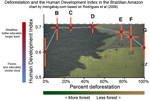
(06/11/2009) Deforestation generates short-term benefits but fails to increase affluence and quality of life in the long-run, reports a new study based an analysis of forest clearing in 286 municipalities across the Brazilian Amazon. The research, published in Friday’s issue of the journal Science, casts doubt on the argument that deforestation is a critical step towards development and suggests that mechanisms to compensate communities for keeping forests standing may be a better approach to improving human welfare, while simultaneously sustaining biodiversity and ecosystem services, in rainforest areas.
(06/04/2009) Indonesia’s decision earlier this year to allow conversion of up to 2 million hectares of peatlands for oil palm plantations is “a monumental mistake” for the country’s long-term economic prosperity and sustainability, argues an editorial published in the June issue of Frontiers in Ecology and the Environment.
Brazil to sanction illegal colonization in 230,000 sq mi of Amazon rainforest
(06/08/2009) Brazil moved a step closer to passing a controversial law that would allow landowners who illegally deforested land in the Amazon to get legal title to these holdings. Environmentalists say HB 458 — which now only needs the signature of President Lula, an avid supporter — will legitimize years of illegal colonization and may promote new deforestation.
Brazil’s plan to save the Amazon rainforest

(06/02/2009) Accounting for roughly half of tropical deforestation between 2000 and 2005, Brazil is the most important supply-side player when it comes to developing a climate framework that includes reducing emissions from deforestation and forest degradation (REDD). But Brazil’s position on REDD contrasts with proposals put forth by other tropical forest countries, including the Coalition for Rainforest Nations, a negotiating block of 15 countries. Instead of advocating a market-based approach to REDD, where credits generated from forest conservation would be traded between countries, Brazil is calling for a giant fund financed with donations from industrialized nations. Contributors would not be eligible for carbon credits that could be used to meet emission reduction obligations under a binding climate treaty.
Nike, Unilever, Burger King, IKEA may unwittingly contribute to Amazon destruction, says Greenpeace

(06/01/2009) Major international companies are unwittingly driving the deforestation of the Amazon rainforest through their purchases of leather, beef and other products supplied from the Brazil cattle industry, alleges a new report from Greenpeace. The report, Slaughtering the Amazon, is based on a three-year undercover investigation of the Brazilian cattle industry, which accounts for 80 percent of Amazon deforestation and roughly 14 percent of the world’s annual forest loss. Greenpeace found that Brazilian beef companies are important suppliers of raw materials used by leading global brands, including Adidas/Reebok, Nike, Carrefour, Eurostar, Unilever, Johnson & Johnson, Toyota, Honda, Gucci, Louis Vuitton, Prada, IKEA, Kraft, Tesco and Wal-Mart, among others.
New rainforest reserve in Congo benefits bonobos and locals

(05/25/2009) A partnership between local villages and conservation groups, headed up by the Bonobo Conservation Initiative (BCI), has led to the creation of a new 1,847 square mile (4,875 square kilometer) reserve in the Democratic Republic of Congo (DRC). The reserve will save some of the region’s last pristine forests: ensuring the survival of the embattled bonobo—the least-known of the world’s four great ape species—and protecting a wide variety of biodiversity from the Congo peacock to the dwarf crocodile. However, the Kokolopori Bonobo Reserve is worth attention for another reason: every step of its creation—from biological surveys to reserve management—has been run by the local Congolese NGO and villages of Kokolopori.
Peru gets $120m to protect 212,000 sq mi of Amazon rainforest
(05/13/2009) The Japanese government will loan Peru $120 million to protect 55 million hectares (212,000 square miles) of Amazon rainforest over the next ten years, reports El Comercio.
Republic of Congo to turn over 25 M acres of land to South African farmers
(04/20/2009) The government of Republic of Congo (Brazzaville) has offered 25 million acres (10 million hectares) of land to South African farmers in an effort to improve the central African nation’s food security, reports Reuters. The area is nearly twice the amount of arable land in South Africa.
Will palm oil drive deforestation in the Amazon?
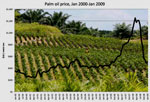
(03/23/2009) Already a significant driver of tropical forest conversion across southeast Asia, oil palm expansion could emerge as threat to the Amazon rainforest due to a proposed change in Brazil’s forest law, new infrastructure, and the influence of foreign companies in the region, according to researchers writing in the open-access journal Tropical Conservation Science. William F. Laurance, a senior scientist at the Smithsonian Tropical Research Institute (STRI) in Panama City, Panama, and Rhett A. Butler, founder of environmental science web site Mongabay.com, warn that oil palm expansion in the Brazilian Amazon is likely to occur at the expense of natural forest as a result of a proposed revision to the forest code which requires land owners to retain 80 percent forest on lands in the Amazon. The new law would allow up to 30 percent of this reserve to consist of oil palm.
Norway emerges as champion of rainforest conservation

(03/19/2009) While citizens in western countries have long paid lip service to saving rainforests, Norway has quietly emerged as the largest and most important international force in tropical forest conservation. The small Scandinavian country has committed 3 billion krone ($440 million) a year to the effort, a figure vastly greater than the $100M pledged — but never fully contributed — by the United States under the Tropical Forest Conservation Act (TFCA). Norway now hopes it can help push to include forest conservation in the successor to the Kyoto Protocol by providing funding and fostering cooperation among international actors like the UN and World Bank, as well as developing countries, to fund the creation of an international architecture which makes it possible to incorporate deforestation and degradation into a post-2012 climate regime.
Economic crisis hurts forestry sector, sustainability initiatives
(03/16/2009) The global economic crisis has slowed demand for timber products and may undermine efforts to improve the environmental performance of forestry, reports the U.N. Food and Agriculture Organization (FAO) in its biannual “State of the World’s Forests 2009”, released today.
Papua New Guinea creates first nature reserve

(03/03/2009) Home to numerous endemic species and some of the Asia’s last intact tropical forests, Papua New Guinea has created its first national conservation area. Unique in structure, the park is owned by 35 surrounding indigenous villages which have agreed unanimously to prohibit hunting, logging, mining, and other development within the park. The villages have also created a community organization that will oversee management of the park. The 10,000 villagers found partners in Wooland Park Zoo in Seattle, Conservation International, and National Geographic. The conservation organizations spent twelve years working with locals and the Papua New Guinea government to establish the YUS Conservation Area.
80% of agricultural expansion since 1980 came at expense of forests
(02/15/2009) More than half of cropland expansion between 1980 and 2000 occurred at the expense of natural forests, while another 30 percent of occurred in disturbed forests, reported a Stanford University researcher presenting Saturday at the annual meeting of the American Association for the Advancement of Science (AAAS) in Chicago.
Malaysian government says forest reserve ‘plundered’ for oil palm development
(02/03/2009) Responding to allegations by the Human Rights Commission of Malaysia (Suhakam) that indigenous people have been forced from their lands (a charge it denied), the Sabah Forestry Department said that more than 30 percent of Mt. Pock And Tanjong Nagos Forest Reserves were “plundered” by “people with means to plant illegal oil palm including companies” up until 2001. The statement is noteworthy in that leaders of the Malaysian Palm Oil Council, the marketing and lobbying arm of the Malaysian palm oil industry, have maintained that oil expansion has not taken place at the expense of natural forest in Malaysia.
What does slowing economy mean for rainforest conservation?

(01/26/2009) Plunging commodity prices may offer a reprieve for the world’s beleaguered tropical forests. The global economic downturn has caused demand for many commodities to plummet. The resulting decline in the prices of timber, energy, minerals and agricultural products may do what conservationists have largely failed to achieve in recent years: slow deforestation. Fueled by surging demand from China and other emerging economies, and boosted by the convergence of food and energy markets in response to American and European incentives for biofuels, the worldwide commodity boom over the past few years helped trigger a land rush that precipitated the conversion of natural forests for farms, plantations, and ranches. At the same time, high prices for metals, fossil fuels, and other industrial resources drove a global search for exploitable reserves, many of which lie in tropical forest countries. Now that the bonanza is unwinding, with prices for everything from palm oil to bauxite to crude oil cratering, the incentives to clear forests are retreating. Developers large and small are abandoning projects and forgoing planned expansion around the world.
